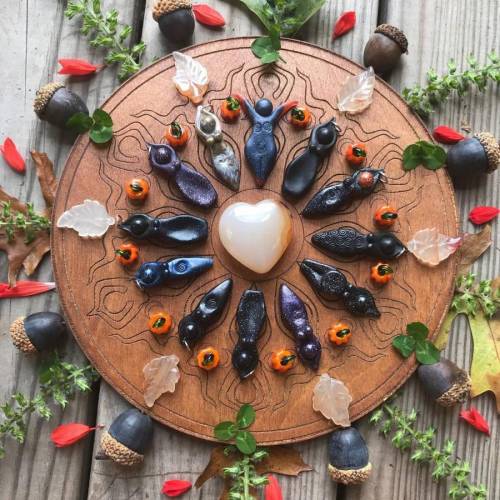Unsurprisingly, medieval Irish literature is filled with references to the Feast of Samhain.
But in the entire corpus, she—that is to say, Samhain herself—turns up in person only once.
(That Samhain is a woman should surprise no one: in Irish, the word is grammatically feminine. The male “Samhain the Druidic Lord of the Dead” is a figment of 19th century folkloric imagination.)
The epic known as the Destruction of the Red God's Hostel tells of the death of Conaire Mor, Connory the Great, the Skyclad King of Ireland. (The tale of how he came by such a surprising title I'll tell you some other time.) As is usual in such tales, his downfall is brought about by his progressive—if inadvertent—violation of his personal geasa, the sacred taboos laid down for him at the time of his king-making.
Our story so far: On, as it happens, the Eve of the Feast of Samhain, Conaire Mor and his companions are feasting in the Hostel of the Red God. Then, after sunset, a woman appears at the door and seeks admission.
As long as a weaver's beam, and as black, her two shins. She wore a very fleecy, striped mantle. Her beard reached to her knees, and her mouth was on one side of her head. She put one shoulder against the doorpost and cast a baleful eye on the king and the youths about him.
So the Book of the Dun Cow describes her.
Conaire Mor: Well then, woman: if you are a seer, what do you see for us?
Woman: Indeed, I see that neither hide nor hair of you will escape from this house, save what the birds bear off in their claws.
Conaire Mor: That is an ill fortune indeed; nor do you usually prophesy for us. Woman, what is your name?
Woman: Cailb [she-dog].
Conaire Mor: That is a name with nothing to spare.
Woman: Indeed, I have many names.
Conaire Mor: What are they?
Woman: Easily told.
She then recites a list of 32 “names,” none of which is an actual woman's name. (Interesting as it would be to know the meaning of the 32 Names of Samhain, such a task far outstrips my knowledge of Old Irish vocabulary, alas.) The first of the list, though, is Samhain.
(The Book of the Dun Cow specifies that she recites this list in one breath, while standing on one foot, in the doorway of the house. Clearly, powerful magic is at work here.)
Conaire asks the woman what she wants, and she demands guest-room for the night.
Conaire Mor: It is geis to me to admit a lone woman to the house after nightfall.
Woman: Geis or no, I will not leave until I am given hospitality.
Conaire offers to send her an ox, a salted pig, and all the leftovers of the night's feast if only she will go elsewhere, but the woman refuses.
Woman: Indeed, if the king cannot spare a meal and a bed to one woman in his house, then let the kingship be taken from him and given to a man of honor instead.
Caught in a bind between competing demands, his personal geasa and the laws of hospitality, Conaire relents and admits the woman, but (as The Book of the Dun Cow says) “a great fear came over the host.”
And, indeed, every one of her prophecies comes true.
The personification of holidays as visiting guests is a long-standing trope of Indo-European poetics, spanning the entire Indo-European-speaking diaspora, and there can be little doubt that this is exactly what we see here.
What, then, does this tale tell us about Samhain the Feast?
Easily told.





















